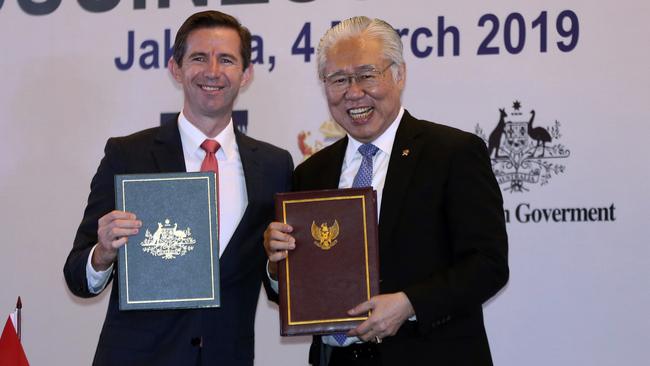Indonesia, Australia finally sign free-trade agreement
Indonesia and Australia have set aside years of rocky negotiations, punctuated by diplomatic stoushes and mutual mistrust, to sign a broad trade agreement.

Indonesia and Australia have set aside years of rocky negotiations, punctuated by diplomatic stoushes and mutual mistrust, to sign a broad trade agreement that commits the two countries to groundbreaking economic collaboration.
The Indonesia Australia Comprehensive Partnership Agreement (IA-CEPA) was inked by the respective trade ministers at a ceremony in a four-star Jakarta hotel marked more by a sense of relief than buoyancy among business representatives from both sides looking on.
“Today is definitely one of the brightest moments in Indonesian Australian relations,” Indonesian trade minister Enggartiasto Lukita said in opening remarks in which he emphasised the importance of the two economies growing “hand in hand”.
“This new concept of partnership will transform Indonesia and Australia together into an economic powerhouse in the region by combining our huge potentials. The IA-EPA is not only commercially powerful but also meaningful for our society.”
Australian trade minister Simon Birmingham said the agreement marked a “new chapter of co-operation and economic engagement” between Indonesia and Australia who were “sending a message to the world that co-operation and trust within a framework of modern and ambitious trade rules is the best path forward”.
Mr Birmingham also paid tribute to former Prime Minister Malcolm Turnbull during his speech, saying the “ongoing strengthening of the Indonesia Australia relationship and new opportunities created for young people in both of our countries will be a legacy both (Indonesian) President Widodo and former PM Turnbull can be proud of”.
Neither side has understated the difficulties of concluding a deal between two largely-competitive economies.
Negotiations stalled a number of times; after revelations that Australia had spied on the Indonesian cabinet, and again following the 2015 execution of Bali Nine ringleaders Andrew Chan and Myuran Sukumaran.
Then, a few months ahead of the expected November 2018 signing, Scott Morrison announced Australia was considering recognising Jerusalem as the Israeli capital.
Miffed they had not been forewarned, the Indonesians deferred again.
The IA-CEPA must still be ratified by both parliaments before it comes into force _ no easy feat on either side of the Indian Ocean where trade deals are politically sensitive and never more so than before imminent elections in both countries.
But both Mr Birmingham and Mr Lukita said they hoped the deal would be ratified and come into force by the end of this year.
Should that occur, the deal will reduce or eliminate tariffs on 99 per cent of Australia’s current trade with Indonesia, and improve access for Australian cattle, vegetable and grain farmers _ including 500,000 tonnes of additional Australian grain bound for Indonesian feedlots _ to Indonesia’s 260 million people.
Australian universities, Tafes, health providers and miners will also benefit from easier entry to Southeast Asia’s biggest economy.
Greater access to the Australian market is expected to spur Indonesia’s automotive and textile industries, and boost exports of timber, electronic and medicinal goods.
The agreement is underpinned by the so-called Powerhouse Concept, a sort of hothouse program of investment and development projects using skills, raw products and labour from both countries to develop products for third country markets.
Neither side has been willing to put a value on the IA-CEPA, which will provide only modest gains in the short term.
But for Indonesia the optics are as important as the detail, signalling to the global market that the traditionally protectionist country is opening up.
For Australia, it is as much about building a broad foundation of links that can stabilise and strengthen one of its most important, but volatile, diplomatic relationships, as it is about better market access.
Trade analysts agree the details of the deal are less remarkable than the fact it has finally been signed.
“This is many, many years of hard work. Indonesia has not really negotiated bilateral FTAs. There is really no constituency there for liberalising access for trade and investment, or even co-operating with a foreign partner on those issues,” says Matthew Busch, a Southeast Asia politics and trade analyst with the Lowy Institute.



